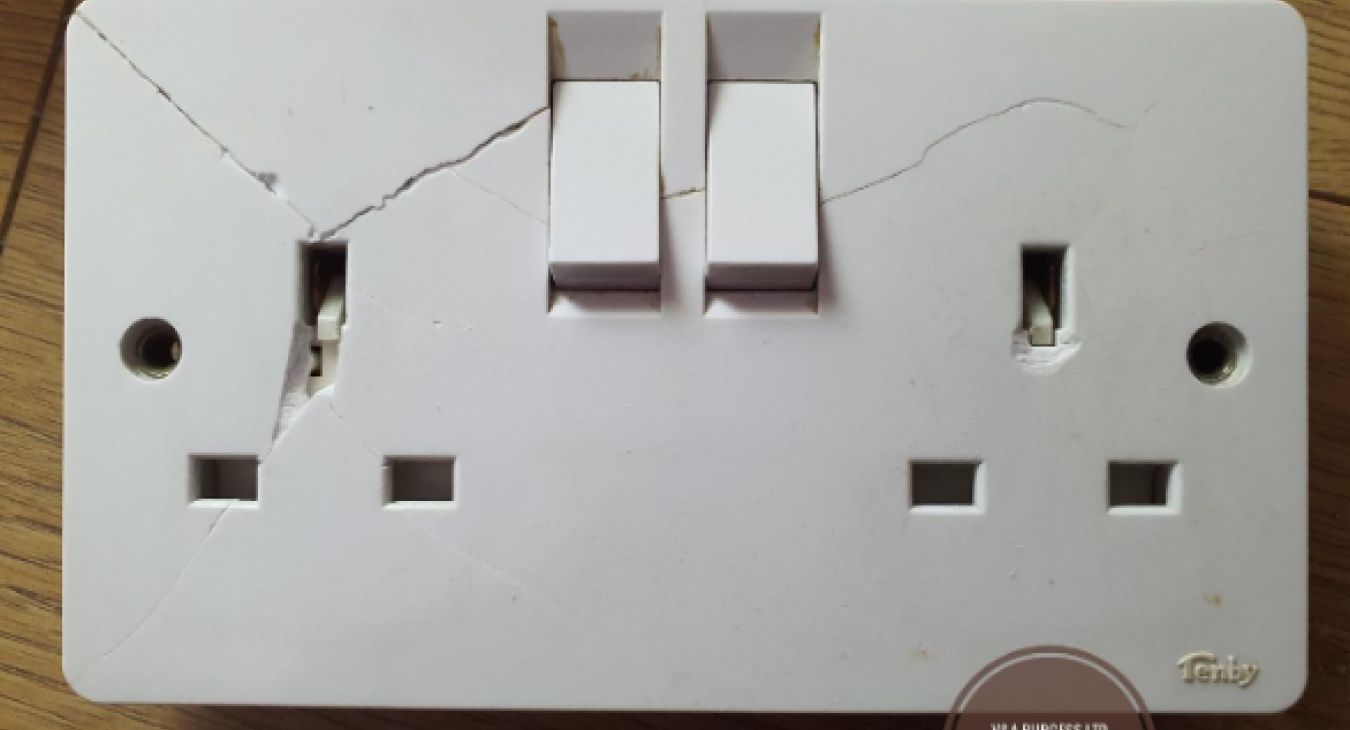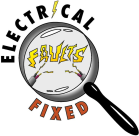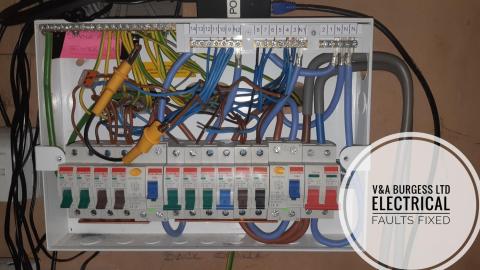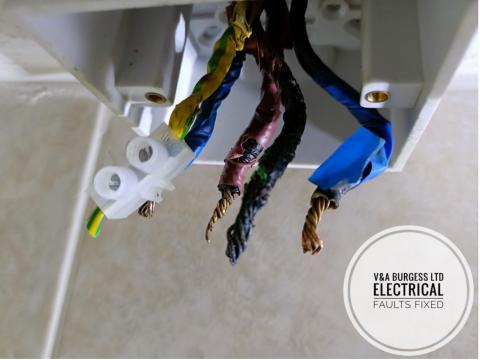
When plug sockets stop working, it can cause great confusion and concern for homeowners and with good reason. Plug sockets failing can indicate that there is a serious issue with the electrical system in your home.
You may find that a circuit breaker has tripped or perhaps an RCD type device. The electrical circuit that powers the electrical outlets is also commonly used to power other electrical equipment such as the gas boiler, the oven, and other appliances around your property.
If you have NO SOCKETS WORKING LIVERPOOL then there could be a number of causes, some more common than others such as:
- Faulty Appliances
- Short Circuit
- Plug Sockets Burnt Out
- Faulty Wiring
- Wet Electrics
- Loose Connection
1) Faulty Appliance
When an appliance goes bad, it will often not only stop working but may also cause an electrical fault at the same time. Appliances contain many electrical devices which can fail causing electrical issues with the entire wiring system in your home.
One of the first things that you should do if you have no sockets working is to check the fuse board, consumer unit or electrical panel for a blown fuse or tripped breaker. If ALL the power has gone off you could find that your Main Switch has tripped off.
If the main switch has NOT tripped (not all of them do) then check to see if there is another switch that is in the down position. If you have fuses then you will have to check to see if these have blown.
Before resetting a switch or replacing a fuse, the first thing you must do is to unplug all the appliances in your sockets. Do not simply turn off an outlet, remove the plug from the wall. Once you have removed all of the appliance plugs from the wall, you can try resetting the breaker switch.
Back to top2) Short Circuit
A Short circuit is a situation where the electrical system has gone faulty somewhere. The ‘Short Circuit’ itself means that there is virtually no electrical resistance between LINE and NEUTRAL.
This is an unnatural situation for electrical wiring because everything in the electrical system that uses power presents an electrical resistance to current flow. Light bulbs will have a very high resistance that only allows a tiny amount of power to be used, electrical heaters will have a much lower resistance and use more power demanding more electrical current.
The smaller the resistance the greater the amount of electrical current that will flow. When there is virtually no resistance in the circuit as is the case when wires ‘short out’ a MASSIVE electrical current is allowed to flow and will normally blow a fuse or trip a breaker.
A short circuit is not something that can be easily traced without knowledge and electrical test equipment so its best to call your local Liverpool Electrician to come and check things out for you.
Back to top3) Plug Sockets Burnt Out
When plug sockets burn out, we may not know about it. There can be substantial damage to the plug sockets and the wiring behind with virtually no outward signs. This can cause a socket to melt at the rear shorting out the terminals and causing switches to trip in the consumer unit or fuse box.
One Faulty Socket can cause ALL the plug sockets to fail in the property. The faulty plug socket may not be obviously faulty and usually an electrician is required in order to ascertain the offending item and the cause of the fault.
Back to top4) Faulty Wiring
As well as appliances and plug sockets, wiring itself can go faulty. There can be all manner of strange occurrences that mean wiring goes faulty.
The most common issue with wiring is the insulation (the coloured jacket around the copper) breaks down and electrical current is allowed to ‘leak’ across from one conductor to another. This breakdown in insulation can occur in the form of microcracks due to wear, age or overload and is irreversible damage to cabling.
Impact to wiring can also cause conductors inside to touch, insulation to fracture or damage the copper inside. Again, as with plug sockets, there is often no outward sign that cables have deteriorated and specialist test equipment along with electricians knowledgeable in testing and inspection will be needed to pin down the cause.
Electrical fault finding is a process that involves an unknown period of time in order to complete.
Back to top5) Wet Electrics
Where an electrical plug or an electrical socket becomes wet, this ingress of moisture will more than likely cause an RCD (Residual Current Device) to trip inside the consumer unit. This is typically the case in bad weather with an external socket.
The moisture penetrates the wiring or terminals of plug sockets and creates a conductive bridge that allows some electrical current to pass from Line or Neutral to Earth. This creates electrical current ‘leakage’ and results in the fuse box or consumer unit thinking that someone is suffering an electrical shock.
Where it has been established that there is definitely water in something, your electrician will be able to check if it is affecting the electrical system. In many circumstances the right electrician will be able to bypass or disconnect any affected equipment but, in some circumstances, the electrical circuit that is affected will need to be switched off or disconnected in order to restore power to other areas.
Electrical problems involving moisture almost always require some other action in order to prevent reoccurrence. Leaky roofs, poor plumbing, damp walls and other property issues may need to be rectified before the electrical side can be repaired or replaced.
Your electrician will let you know the best course of action so that you can make an informed decision.
6) Loose Connection
Mains sockets can demand a lot of electrical power at times and when combined with the general lack of maintenance that occurs in domestic electrical systems, loose connections can occur frequently.
Loose connections will regularly cause dead outlets to occur and can result in an electrical emergency. Connections can work loose anywhere on the sockets ring main or radial circuit including at the origin in the fuse board or consumer unit.
Where loose connections happen, another situation occurs. The more electrical demand there is on the wiring the hotter the temperatures will become when loose connections occur. This can cause consumer unit overheating, buzzing and fire.
The resultant damage from this situation can be extensive and electrical repairs may require part of the wiring to be replaced (especially the case with outdated wiring) or the consumer unit to be replaced.
If you have NO SOCKETS WORKING LIVERPOOL then do not delay, have the problem checked immediately by a professional electrician. Emergency electricians will carry the correct test equipment and parts to find faults and repairs most issues the same day.
Back to top7) No Sockets Working but Lights are
With certain types of fuse box or consumer unit, you may find that you have only the lights working in the property. This is common with consumer units installed from the 1990s until early 2000s.
There is usually an RCD protective switch device that will cut the electrical supply to all the circuits except for the lights. This could mean that any one of the other circuits has a fault. If this is the case, you may be able to narrow down the issue using our help sheet.
The help sheet is not a complete fix, will not work in all situations and does not negate the need for an electrician in some cases but it is free 😊
Back to top8) Common Questions
8.1) Are old socket outlets dangerous?
As electrical accessories and wiring ages, they naturally degrade and can being to fail. Common causes of failure for socket outlets are the internal mechanism and moving parts becoming worn. The shutters may fail, the metal parts can corrode and rust, the metal contact points can become slack.
High resistances are created when metals become worn, corroded, or other wise begin making poor contact and as a result, unwanted heat is generated. This can be a dangerous situation as heat and resistance increase together, so does the risk of electrical fire and property damage.
If your socket outlets are very old then it is a good idea to have them checked by an electrician. Once your electrical system reaches 10 years old it is recommended to have it checked by a professional electrician including the plug socket outlets.
8.2) How many USB sockets can I have?
Whilst USB plug socket outlets are very convenient for charging all our modern USB devices, they can cause issues on the electrical circuit. These devices are often not designed to sit in standard back boxes of 25mm depth.
This can cause wires to become crushed behind resulting in shorting out and possible wiring damage. There is also a potential for excessive earth leakage from these devices causing an RCD tripping problem in the fuse box or consumer unit. Your electrician will be able to tell you how many USB sockets are suitable for your home electrical system.
8.3) Are too many sockets in the house dangerous?
Generally speaking, no. Too many plug sockets is not necessarily dangerous. Too few is more likely to create a problem rather than too many. Where there are fewer plug sockets than we actually need, we are more likely to overload them with extension leads and power extender blocks creating a possible overheating problem.
Lots of electrical sockets means that there are many potential places to plug things in. The electrical circuit should be correctly designed to ensure that if too many appliances are plugged in then the circuit breaker will trip and disconnect the power to the plug sockets.
Unwanted tripping of the socket outlets is more of an issue when there is a single circuit for the sockets for the entire house as was common several decades ago.
Back to top9) Summary
If you have NO SOCKETS WORKING LIVERPOOL then please get in touch to discuss your problems. Call us on 0151 351 4011.
Back to top











